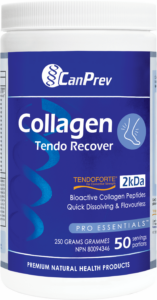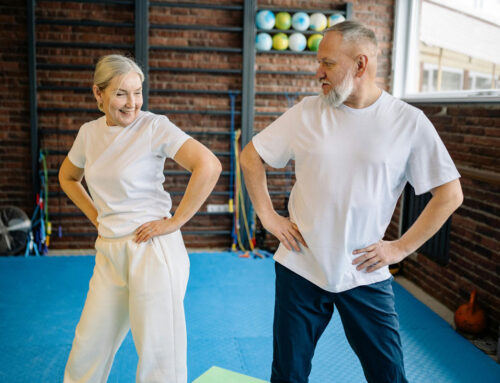Did you know that collagen is the most abundant protein in your body? It can be found all over, from your teeth to your nail beds, and your skin to your bones. Collagen is what binds us together so we don’t fall apart. So, it makes sense that it’s also found in our muscles, organs, arteries, the cornea of our eyes and our tendons and ligaments. It’s a pretty important component of the human body that helps us heal from overuse injuries.
Collagen and your tendons and ligaments
Tendons are extremely strong connective tissues that attach a muscle to a bone, which makes healthy tendons very important for mobility and joint stability. Their strength and stretch allow them to transmit force and withstand tension during muscle contractions. As any athlete who’s suffered an Achilles rupture can tell you, you’d miss them if they were gone! Tendons are a whopping 85% type I collagen.
Ligaments act as joint stabilizers: tough, criss-crossing bands of fibrous tissue that attach bones together. They limit the motion of joints to prevent injury, like how a car’s shock absorbers keep it from bouncing uncomfortably on a rough road. For example, four major ligaments keep the knee from moving too far forward, backward, left, or right. You’ve likely heard of one of these, the anterior cruciate ligament or ACL, more than the others, due to its common prevalence among professional athletes. Collagen makes up about 80% of ligaments’ dry weight. You can strengthen your tendons and ligaments through resistance training and other exercises.
What is an overuse injury?
An overuse injury is a form of muscle or joint injury that can be caused by repetitive motion. It can happen when you physically exert yourself more than your body can handle in a short period of time or through long-term repetitive movements. It usually impacts the tendons and ligaments that connect our muscles to our joints and bones.
Common areas of injury
Although these types of injuries can happen to anyone, overuse and repetitive motion injuries often happen through sport, training, poor exercise form, improper technique, or lack of warm-up or cool-down during intense training.
Active individuals and those of us who are aging often experience discomfort or pain from these injuries at the rotator cudd, elbow epicondyles, patellar, and Achilles tendon.
Overuse injuries to dense collagenous tissues such as tendons, ligaments, cartilage, intervertebral disc, bone, and skin are common. These injuries can be difficult to treat since the rate of damage accumulates over time and this happens faster than the rate that your body can repair. This can either be due to aging or because of increased amounts of stress on the tissue.

Factors that affect your body’s collagen levels
There are some factors that contribute to reducing collagen levels in your body. These include:
- High sugar consumption
- Alcohol and smoking
- Too much sunlight or training in the heat
- Lack of sleep (our bodies need time to repair)
- Lack of key nutrients for collagen synthesis (like minerals such as silicon and vitamin C)
- Age
The role of collagen in overuse injuries
One study examined the effects of taking collagen over a 24-week period for athletes. They found that collagen supplementation helped reduce joint pain caused by overuse as a result of athletic performance.
Recovering from a tendon injury can be a long process. However, supplementing with the right collagen peptides can help. Studies have shown that CanPrev’s Collagen Tendo Recover peptides support ligaments and tendons. This particular collagen supplement contains unique, specialized TendoForte® Bioactive Peptides™ at the size of 2kDa. Peptides at this size have been clinically studied for chronic ankle instability and Achilles tendinopathy symptoms, and recovery from this type of injury can be assisted at the ideal dosage of 5g per day.
How to tell if collagen supplementation might help speed your recovery
Here are some signs to look for:
- Joint pain – While doing everyday tasks, you may experience pain in your hips, knees, spine, and fingers and feel stiffness in the morning or throughout your day.
- Weakness in muscles – If you notice that you can’t lift as much as you used to or struggle with stretching, you may be losing muscle mass. If you follow a sedentary lifestyle and don’t use your muscles often, they start to shrink and weaken.
- Tenderness or soreness – After training, you may feel soreness or tenderness in your body. You may also notice that you bruise easily. As we lose collagen, our skin thins, which means our blood vessels lose some of their protection.
- Slow recovery – After you finish a workout, you may feel that your recovery time is longer. You may also notice that your wounds are taking longer to heal.
When you overuse your collagenous tissues, the amount of collagen in your body slowly decreases due to degradation. The same is true as we age. And the signs may indicate that your body needs more collagen, so it’s important to be aware of them.
Eating a diet rich in collagen can help alleviate these problems. There are some nutrients that promote the formation of collagen in your body. This includes:
- Proline – found in egg whites, soy, and cheese
- Anthocyanins – found in blackberries, blueberries, and cherries
- Copper – found in shellfish, nuts, and red meat
- Vitamin C – found in oranges, strawberries, and peppers
- Vitamin A – found in apricots, asparagus, and kale as beta-carotene
If you’re finding it difficult to support collagen production through your diet, you can also try taking a collagen supplement. Whether you’re an active individual or someone who’s dealing with the process of aging, collagen supplementation can help you maintain collagen levels and reduce the likelihood of overuse injuries.
Remember, collagen is your best friend when it comes to keeping your body strong, structured, and healthy!
Sources:
Accumulation of collagen molecular unfolding is the mechanism of cyclic fatigue damage and failure in collagenous tissues
24-Week study on the use of collagen hydrolysate as a dietary supplement in athletes with activity-related joint pain
What is collagen, and why do people use it?
All you need to know about beta carotene
Overuse injuries in tendon tissue: insight into adaptation mechanisms








Leave A Comment